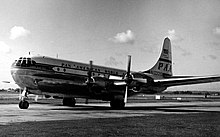 A Pan Am Stratocruiser similar to the one involved in the accident. | |
| Accident | |
|---|---|
| Date | March 26, 1955 |
| Summary | Engine separation, water ditching |
| Site | Pacific Ocean 35 miles (56 km) West of Oregon, United States 43°48′15″N 125°12′40″W / 43.80417°N 125.21111°W |
| Aircraft | |
| Aircraft type | Boeing 377 Stratocruiser 10-26 |
| Aircraft name | Clipper United States |
| Operator | Pan American World Airways |
| Registration | N1032V |
| Flight origin | Seattle-Tacoma, Washington |
| 1st stopover | Portland International Airport |
| 2nd stopover | Honolulu International Airport |
| Destination | Sydney, Australia |
| Passengers | 15 |
| Crew | 8 |
| Fatalities | 4 |
| Injuries | unknown |
| Survivors | 19 |
Pan Am Flight 845/26 was a four-engined Boeing 377 Stratocruiser named Clipper United States and registered as N1032V. It departed Portland International Airport in Oregon on a flight to Honolulu International Airport in Hawaii on March 26, 1955. The aircraft was en route and about 35 miles (56 km) off the Oregon coast when at 11:12 Pacific Standard Time the No. 3 engine and propeller tore loose from the wing causing a loss of control. The aircraft was ditched.
The aircraft floated for twenty minutes before sinking in 1,600 metres (5,200 ft) of water. Approximately two hours after the aircraft ditched, the United States Navy attack transport USS Bayfield (APA-33) arrived on the scene and rescued the 19 survivors. Four people died.[1]
The probable cause was failure of No. 3 propeller which caused the engine to detach and the aircraft to become uncontrollable.
The experience provided lessons that helped prevent any casualties in another ditching the following year, when Pan Am Flight 6 sank between Honolulu and San Francisco.
- ^ "March 26, 1955: Pan Am Flight 845/26 Crashes Off Oregon Coast". Dave Knows Portland. 26 March 2011. Retrieved 13 November 2015.